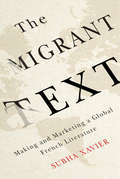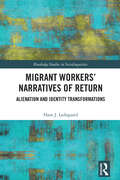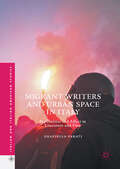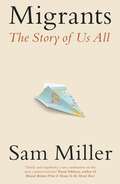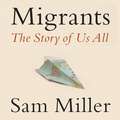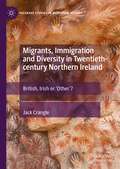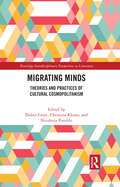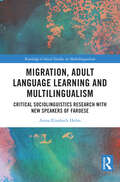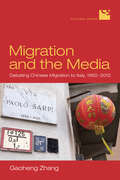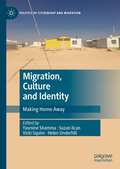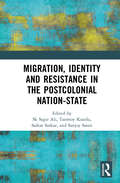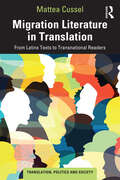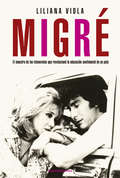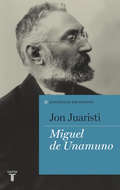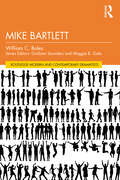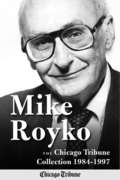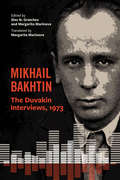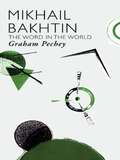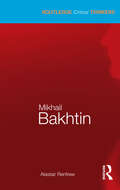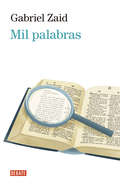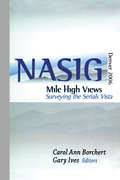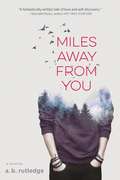- Table View
- List View
Migrant Text: Making and Marketing a Global French Literature
by Subha XavierThe expression "littérature migrante," coined by Québécois critics in the mid-1980s, reflected the emerging body of literary works written by recent immigrants to the province. Redefining the concept of migrancy, Subha Xavier's The Migrant Text argues that global movements of people have fundamentally changed literary production over the past thirty years. Bringing together a corpus of recent novels by immigrants to France and Quebec, Xavier suggests that these diverse works extend beyond labels such as francophone or postcolonial literature to forge a new mode of writing that deserves recognition on its own terms. Weaving together literary theory and salient examples taken from numerous French-language novels, The Migrant Text shows how both external and internal factors shape migrant writing in contemporary French literature. The opening chapters trace the elusive concept of the migrant as it appears in extant theories of nationalism, postcolonialism, world literature, and francophonie. What follows are incisive analyses of fiction written for French audiences by authors from Algeria, Cameroon, China, Haiti, Iraq, and Poland, whose works reveal that the processes of troubling national categories and evading colonial power dynamics can be wellsprings for creativity. One of the most pressing social and political topics of our day, immigration challenges our ideas about homeland and citizenship. Celebrating the courage and tenacity of immigrants from around the world, The Migrant Text carves a new space for discussing the dynamics of global literature.
Migrant Text: Making and Marketing a Global French Literature
by Subha XavierThe expression "littérature migrante," coined by Québécois critics in the mid-1980s, reflected the emerging body of literary works written by recent immigrants to the province. Redefining the concept of migrancy, Subha Xavier’s The Migrant Text argues that global movements of people have fundamentally changed literary production over the past thirty years. Bringing together a corpus of recent novels by immigrants to France and Quebec, Xavier suggests that these diverse works extend beyond labels such as francophone or postcolonial literature to forge a new mode of writing that deserves recognition on its own terms. Weaving together literary theory and salient examples taken from numerous French-language novels, The Migrant Text shows how both external and internal factors shape migrant writing in contemporary French literature. The opening chapters trace the elusive concept of the migrant as it appears in extant theories of nationalism, postcolonialism, world literature, and francophonie. What follows are incisive analyses of fiction written for French audiences by authors from Algeria, Cameroon, China, Haiti, Iraq, and Poland, whose works reveal that the processes of troubling national categories and evading colonial power dynamics can be wellsprings for creativity. One of the most pressing social and political topics of our day, immigration challenges our ideas about homeland and citizenship. Celebrating the courage and tenacity of immigrants from around the world, The Migrant Text carves a new space for discussing the dynamics of global literature.
Migrant Workers’ Narratives of Return: Alienation and Identity Transformations (Routledge Studies in Sociolinguistics)
by Hans J. LadegaardDrawing on a corpus of 113 narratives told by migrant workers who have returned to their home country, Ladegaard details Indonesian and Filipina (domestic) migrant workers’ experiences of homecoming after years of work abroad, separated from their loved ones. The narratives deal with two major themes: 1) Migrant workers’ experiences in the diaspora, which for many, particularly Indonesian workers, were associated with abuse and exploitation leading to trauma; and 2) migrant workers’ experiences of coming home, which include both the happy reunion with the family but also concerns about not ‘fitting in’ and the need to reinvent themselves because they are not who they were when they left. This is particularly true for workers whose migratory journeys have failed and who have come back to their hometowns without any financial award. Chapters also explore the major difference between Filipina and Indonesian migrant workers’ overseas experiences. The Filipina returnees share mostly positive stories while the Indonesian returnees uncover mostly negative stories, further illuminating what may explain these diverse migratory experiences. Finally, the book discusses how research on disenfranchised groups like (domestic) migrant workers can be used for social and political action. An excellent text that will appeal to academics, teachers and postgraduate students in the humanities and social sciences, particularly in sociolinguistics, applied linguistics, intercultural communication, anthropology, and migration studies.
Migrant Writers and Urban Space in Italy
by Graziella ParatiThis book is about migrants' lives in urban space, in particular Rome and Milan. At the core of the book is literature as written by migrants, members of a "second generation," and a filmmaker who defines himself as native. It argues that the narrative authored by migrants, refugees, second generation women, and one "native Italian" perform a reparative reading of Italian spaces in order to engender reparative narratives. Eve Sedgwick wrote about our (now) traditional way of reading based on unveiling and on, mainly, negative affect. We are trained to tear the text apart, dig into it, and uncover the anxieties that define our age. Migrants writers seem to employ both positive and negative affects in defining the past, present, and future of the spaces they inhabit. Their recuperative acts of writing, constitute powerful models of changes in/on place. As they look at Italian exclusionary spaces, they also rewrite them into a present whose transitiveness allows to imagine a process of citizenship and belong constructed from below.
Migrants: The Story of Us All
by Sam MillerMigrants cuts through the toxic debates to tell the rich and collective stories of humankind's urge to move.'Fascinating... Miller's perspective may be just what we need' Daily Telegraph'Timely and empathetic: a rare combination on this most controversial issue' Remi Adekoya, author of Biracial Britain'Tremendous: blends the personal and the panoramic to great effect' Robert Winder, author of Bloody ForeignersHumans are, in fundamental ways, a migratory species, more so than any other land mammal. For most of our existence , we were all nomads, and some of us still are. Houses and permanent settlements are a relatively late development - dating back little more than twelve thousand years. Borders and passports are much more recent. From the Neanderthals, Alexander the Great, Christopher Columbus and Pocahontas to the African slave trade, Fu Manchu, and Barack Obama, Migrants shows us that it is only by understanding how migration and migrants have been viewed in the past, that we can re-set the terms of the modern-day debate about migration.Migrants presents us with an alternative history of the world, in which migration is restored to the heart of the human story. And in which humans migrate for a wide range of reasons: not just because of civil war, or poverty or climate change but also out of curiosity and a sense of adventure. On arrival, migrants are expected both to assimilate and encouraged to remain distinctive; to defend their heritage and adopt a new one. They are sub-human and super-human; romanticised and castigated, admired and abhorred. Migrants tells us that this is not a new narrative; this is the history of us all, part of everybody's backstory - for those who consider themselves migrants and those who do not.
Migrants: The Story of Us All
by Sam MillerMigrants cuts through the toxic debates to tell the rich and collective stories of humankind's urge to move.'Fascinating... Miller's perspective may be just what we need' Daily Telegraph'Timely and empathetic: a rare combination on this most controversial issue' Remi Adekoya, author of Biracial Britain'Tremendous: blends the personal and the panoramic to great effect' Robert Winder, author of Bloody ForeignersHumans are, in fundamental ways, a migratory species, more so than any other land mammal. For most of our existence , we were all nomads, and some of us still are. Houses and permanent settlements are a relatively late development - dating back little more than twelve thousand years. Borders and passports are much more recent. From the Neanderthals, Alexander the Great, Christopher Columbus and Pocahontas to the African slave trade, Fu Manchu, and Barack Obama, Migrants shows us that it is only by understanding how migration and migrants have been viewed in the past, that we can re-set the terms of the modern-day debate about migration.Migrants presents us with an alternative history of the world, in which migration is restored to the heart of the human story. And in which humans migrate for a wide range of reasons: not just because of civil war, or poverty or climate change but also out of curiosity and a sense of adventure. On arrival, migrants are expected both to assimilate and encouraged to remain distinctive; to defend their heritage and adopt a new one. They are sub-human and super-human; romanticised and castigated, admired and abhorred. Migrants tells us that this is not a new narrative; this is the history of us all, part of everybody's backstory - for those who consider themselves migrants and those who do not.
Migrants: The Story of Us All
by Sam MillerMigrants cuts through the toxic debates to tell the rich and collective stories of humankind's urge to move.'Fascinating... Miller's perspective may be just what we need' Daily Telegraph'Enjoyable, provocative and timely' Spectator'Timely and empathetic: a rare combination on this most controversial issue' Remi Adekoya, author of Biracial Britain'Tremendous: blends the personal and the panoramic to great effect' Robert Winder, author of Bloody ForeignersHumans are, in fundamental ways, a migratory species, more so than any other land mammal. For most of our existence , we were all nomads, and some of us still are. Houses and permanent settlements are a relatively late development - dating back little more than twelve thousand years. Borders and passports are much more recent. From the Neanderthals, Alexander the Great, Christopher Columbus and Pocahontas to the African slave trade, Fu Manchu, and Barack Obama, Migrants shows us that it is only by understanding how migration and migrants have been viewed in the past, that we can re-set the terms of the modern-day debate about migration.Migrants presents us with an alternative history of the world, in which migration is restored to the heart of the human story. And in which humans migrate for a wide range of reasons: not just because of civil war, or poverty or climate change but also out of curiosity and a sense of adventure. On arrival, migrants are expected both to assimilate and encouraged to remain distinctive; to defend their heritage and adopt a new one. They are sub-human and super-human; romanticised and castigated, admired and abhorred. Migrants tells us that this is not a new narrative; this is the history of us all, part of everybody's backstory - for those who consider themselves migrants and those who do not.
Migrants, Immigration and Diversity in Twentieth-century Northern Ireland: British, Irish or 'Other’? (Palgrave Studies in Migration History)
by Jack CrangleAddressing questions about what it means to be ‘British’ or ‘Irish’ in the twenty-first century, this book focuses its attention on twentieth-century Northern Ireland and demonstrates how the fragmented and disparate nature of national identity shaped and continues to shape responses to social issues such as immigration. Immigrants moved to Northern Ireland in their thousands during the twentieth century, continuing to do so even during three decades of the Troubles, a violent and bloody conflict that cost over 3,600 lives. Foregrounding the everyday lived experiences of settlers in this region, this ground-breaking book comparatively examines the perspectives of Italian, Indian, Chinese and Vietnamese migrants in Northern Ireland, outlining the specific challenges of migrating to this small, intensely divided part of the UK. The book explores whether it was possible for migrants and minorities to remain ‘neutral’ within an intensely politicised society and how internal divisions affected the identity and belonging of later generations. An analysis of diversity and immigration within this divided society enhances our understanding of the forces that can shape conceptions of national insiders and outsiders - not just in the UK and Ireland - but across the world. It provokes and addresses a range of questions about how conceptions of nationality, race, culture and ethnicity have intersected to shape attitudes towards migrants. In doing so, the book invites scholars to embrace a more diverse, ‘four-nation’ approach to UK immigration studies, making it an essential read for all those interested in the history of migration in the UK.
Migrating Minds: Theories and Practices of Cultural Cosmopolitanism (Routledge Interdisciplinary Perspectives on Literature)
by Didier CosteMigrating Minds contributes to the prominent interdisciplinary domain of Cosmopolitan Studies with twenty innovative essays by humanities scholars from all over the world that re-examine theories and practices of cosmopolitanism from a variety of perspectives. The volume satisfies the need for a stronger involvement of Comparative and World Literatures and Cultures, Translation, and Education Theories in this crucial debate, and also proposes an experimental way to explore in depth the necessity of a cosmopolitan method as well as the riches of cosmopolitan representations. The essays follow a logical progression from the situated philosophical and political foundations of the debate to interdisciplinary propositions for a pedagogy of cosmopolitanism through studies of modern and contemporary cosmopolitan cultural practices in literature and the arts and the concurrent analysis of prototypes of cosmopolitan identities. This trajectory allows readers to appreciate new historical, theoretical, aesthetic, and practical implications of cosmopolitanism that pertain to multiple genres and media, under different modes of production and reception. In the de-territorialized landscape of Migrating Minds, mental and sentimental mobility, rather than the legacy of place, is the key to an efficient, humanist response to deadening globalization.
Migrating Minds: Theories and Practices of Cultural Cosmopolitanism (Routledge Interdisciplinary Perspectives on Literature)
by Didier CosteAwarded the 2023 "René Wellek Prize for the Best Edited Essay Collection" by the American Comparative Literature Association, Migrating Minds contributes to the prominent interdisciplinary domain of Cosmopolitan Studies with 20 innovative essays by humanities scholars from all over the world that re-examine theories and practices of cosmopolitanism from a variety of perspectives. The volume satisfies the need for a stronger involvement of Comparative and World Literatures and Cultures, Translation, and Education Theories in this crucial debate, and also proposes an experimental way to explore in depth the necessity of a cosmopolitan method as well as the riches of cosmopolitan representations.The essays follow a logical progression from the situated philosophical and political foundations of the debate to interdisciplinary propositions for a pedagogy of cosmopolitanism through studies of modern and contemporary cosmopolitan cultural practices in literature and the arts and the concurrent analysis of prototypes of cosmopolitan identities. This trajectory allows readers to appreciate new historical, theoretical, aesthetic, and practical implications of cosmopolitanism that pertain to multiple genres and media, under different modes of production and reception. In the deterritorialized landscape of Migrating Minds, mental and sentimental mobility, rather than the legacy of place, is the key to an efficient, humanist response to deadening globalization.
Migration, Adult Language Learning and Multilingualism: Critical Sociolinguistics Research with New Speakers of Faroese (Routledge Critical Studies in Multilingualism)
by Anna-Elisabeth HolmThis book extends lines of inquiry at the nexus of migration, adult language learning, and multilingualism, illuminating the lived experiences of migrants in the Faroe Islands and critical new insights into sociolinguistics from the periphery. Building on recent epistemological shifts in research on minoritized languages, this volume integrates threads from scholarship on migration studies, new speakers, and critical sociolinguistics in examining blue-collar workplaces in the Faroe Islands. In bringing greater attention to these contexts, Holm showcases how these sites, when analyzed via an ethnographic lens, reflect both the changing sociolinguistic landscape at the periphery in light of globalization and adult language learners’ commitment to language learning as a form of personal and social investment. In shedding light on the specific case of Faroese, the volume critically reflects on the specific challenges involved in acquiring a small language in a bilingual context and on those impacting the sustainability of minoritized languages, including the increasing use of English, and the opportunities for stakeholders in language policy and planning to promote greater social inclusion for adult migrants. This volume will be of particular interest to students and scholars in critical sociolinguistics, linguistic anthropology, language education, migration studies, and applied linguistics.
Migration and the Media: Debating Chinese Migration to Italy, 1992–2012 (Cultural Spaces)
by Gaoheng ZhangThe first book to analyze cultural dynamics of Chinese migration to Italy between 1992 and 2012, Migration and the Media compares Italian, Chinese migrant, and international media interpretations. During this twenty-year period, the media covered this migration extensively, revealing the eye-opening characteristics of Italy’s Chinese community. Gaoheng Zhang places the strong media interest in Italian-Chinese migrant relations within relevant economic, political, cultural, and linguistic contexts. Examining how journalists, entrepreneurs, and politicians debated Italy’s Chinese, Zhang argues that these stakeholders viewed the migration as a particularly effective example to support or dispute Italy’s general stance toward migrant integration and economic globalization. Zhang also proposes that an Italian-Chinese migrant cultural repertoire offered the stakeholders resources to cover the migration.
Migration, Culture and Identity: Making Home Away (Politics of Citizenship and Migration)
by Yasmine Shamma Suzan Ilcan Vicki Squire Helen UnderhillThis book is about homemaking in situations of migration and displacement. It explores how homes are made, remade, lost, revived, expanded and contracted through experiences of migration, to ask what it means to make a home away from home. We draw together a wide range of perspectives from across multiple disciplines and contexts, which explore how old homes, lost homes, and new homes connect and disconnect through processes of homemaking. The volume asks: how do spaces of resettlement or rehoming reflect both the continuation of old homes and distinct new experiences?Based on collaborations with migrants, refugees, practitioners and artists, this book centres the lived experiences, testimonies, and negotiations of those who are displaced. The volume generates appreciation of the tensions that emerge in contexts of migration and displacement, as well as of the ways in which racial categories and colonial legacies continue to shape fields of lived experience.
Migration, Identity and Resistance in the Postcolonial Nation-State
by Sk Sagir Ali Tanmoy Kundu Saikat Sarkar Sanjoy SarenThis volume represents a significant contribution to the fields of migration studies, postcolonial theory, and critical geography. It critically engages with the intersections of power, space, and identity to deepen our understanding of the challenges and possibilities of negotiating citizenship and belonging in an increasingly interconnected and precarious world. The book interrogates the construction of nationalist narratives and their role in perpetuating exclusionary paradigms, which marginalize certain demographic segments and reinforce hierarchical notions of belonging. Further, it examines the bio-political mechanisms that engender conditions of precarity, reshaping conceptions of citizenship and nationhood in response to environmental degradation, population control policies, and state surveillance. The essays in the volume delve into the diverse factors driving displacement, encompassing both state-driven policies of engineered displacement and environmental factors such as climate change, resource depletion, and natural disasters. They also focus on the marginalized spaces of displacement and explore how these sites become loci of resistance and incubators of alternative forms of belonging.Interdisciplinary in its approach and rigorous in its empirical analysis, the volume will stimulate further research, provoke new questions, and inspire transformative interventions in the fields of migration and diaspora studies, literary and cultural studies, politics and political processes, and sustainability studies.
Migration Literature in Translation: From Latinx Texts to Transnational Readers (Translation, Politics and Society)
by Mattea CusselMigration Literature in Translation explores the unique case of Latinx literature translated into Spanish, drawing from Latinx studies, sociology, political philosophy and cultural studies. The book focuses on works by Helena María Viramontes, Achy Obejas, Daisy Hernández and Junot Díaz, analysing migration literature and translation as a social practice. Cussel introduces the ‘integrated translation critique’, a new methodology that examines the transformation of texts through translation and their reception, while incorporating empirical social research methods. This innovative approach highlights the roles of various actors—scholars, translators, authors, reviewers, and readers— in shaping Latinx literary texts’ mobility and meaning across languages and cultures.Through qualitative research including focus groups, questionnaires and fieldwork in Europe, Latin America and the US, Cussel sheds light on how transnational readers engage with translated migrant stories. By addressing the cultural, social and political dimensions of translation, this interdisciplinary work offers a sociological perspective on literary translation. It is essential reading for scholars and students in the sociology of translation, Latinx and migration literature, and migration studies.
Migré: El maestro de las telenovelas que revolucionó la educación sentimental de un país
by Liliana ViolaBiografía del creador de telenovelas célebres como Rolando Rivas, taxista, Piel naranja, Pobre diabla y Una voz en el teléfono, que moldearon la historia sentimental de generaciones de argentinos. Lo llamaron "el señor éxito", "el padre de la lágrima" y "el autor del amor". Escribió más de 700 títulos sin más colaboradores que su máquina Remington. Sus telenovelas fueron una verdadera factoría de galanes, parejas románticas y canciones inolvidables. Durante cuatro décadas tuvo en sus manos las emociones domésticas de las tardes y las noches. Con Rolando Rivas taxista, la ficción más recordada de la televisión argentina, conquistó al público masculino y marcó un nuevo estándar en el modo de producir y mirar tv. Se atrevió a plantear un final infeliz en Piel Naranja en vísperas de la dictadura de 1976 e impuso una palabra guaraní -"rojaiju"- en el lenguaje amoroso de los años 70'. Ultimo representante de la telenovela de autor, Alberto Migré sentó las bases de una industria de los sentimientos que se volvió global. En este libro apasionante Liliana Viola construye una biografía a la medida de su personaje donde cada secreto revelado abre las puertas de un secreto mayor. Actores y actrices, directores, admiradores y amigos íntimos aportan testimonios desopilantes y conmovedores para el retrato del hombre que patentó un modo de amar alternativo a la vida real y supo denunciar como ninguno la influencia nefasta del machismo en las relaciones humanas y el factor melodrama en los rencores que signan la política argentina.
Miguel de Unamuno (Colección Españoles Eminentes #Volumen)
by Jon JuaristiLa última biografía de Unamuno, una nueva mirada a su vida y obra. Elegida mejor biografía de 2012 por los lectores de El País. El escritor vasco Miguel de Unamuno y Jugo fue el primer intelectual verdaderamente moderno del país. Su vida, su obra y su muerte, en plena guerra civil, ilustran las contradicciones del decisivo periodo histórico que le tocó transitar. Ningún otro miembro de la generación española del fin del siglo XIX -la llamada «generación del 98»- buscó con tanto ahínco como don Miguel transformar su vida en metáfora del destino nacional. Ésta se convirtió en el resultado de un compromiso entre las circunstancias inevitables y aleatorias de la España de su época y el empeño personal de construirse, a la manera quijotesca, desde una voluntad autónoma y opuesta a todo conformismo. En esta biografía, Jon Juaristi analiza con rigurosa minuciosidad (no exenta de distancia irónica y paradójica simpatía) las influencias que Unamuno asimiló en un pensamiento tan asistemático como profundamente original, así como la que el propio escritor ejerció en los españoles de su tiempo, siguiendo el hilo de una existencia agónica, en permanente lucha con su entorno histórico y en un inacabable debate interior entre la razón desencantada y el ansia de eternidad. Reseñas:«Juaristi, con una de las mejores prosas que se escriben hoy en España, repasa todos los aspectos de Unamuno, los amables y los odiosos... Una biografía soberbia.»Félix de Azúa, El País «Las biografías convierten en libros a los hombres. Miguel de Unamuno, de Juaristi es un buen ejemplo.»Álvaro Cortina, El Mundo «Excelente libro... Una biografía crítica, bien documentada y mejor escrita... Términos como cainismo, intrahistoria, "nivola" o casticismo adquieren aquí el renovado sentido de un análisis inteligente y pormenorizado, ameno y riguroso.»Jesús Ferrer, La Razón
Mike Bartlett (Routledge Modern and Contemporary Dramatists)
by William C. BolesHailed as one of the most talented playwrights to have emerged in the late 2000s, Mike Bartlett's diverse range of plays strike at the heart of the various crises predominant in the early twenty-first century. Offering the first extensive examination of the plays and television series written by award winning playwright Mike Bartlett, this volume not only provides analysis of some of Bartlett’s best-known works (Cock, Doctor Foster, King Charles III, and Albion), but also includes new interviews with Bartlett and some of his closest and oft relied upon collaborators. In this book, Bartlett’s plays and television series are grouped together thematically, allowing the reader to observe the cross-pollination between his works on the stage and screen. The book also includes an introductory biographical chapter that discusses early influences on his writing (Harold Pinter, Mark Ravenhill, Tony Kushner, and Quentin Tarantino), his time in the Young Writers Programme at the Royal Court, and his work with the Apathists.Routledge Modern and Contemporary Dramatists is a series of innovative and exciting critical introductions to the work of internationally pioneering playwrights, giving undergraduate students an ideal point of entry into these key figures in modern drama.
Mike Royko: The Chicago Tribune Collection 1984-1997
by Mike Royko John Kass Chicago Tribune StaffMike Royko: The Chicago Tribune Collection 1984-1997 is an expansive new volume of the longtime Chicago news legend's work. Encompassing thousands of his columns, all of which originally appeared in the Chicago Tribune, this is the first collection of Royko work to solely cover his time at the Tribune. Covering politics, culture, sports, and more, Royko brings his trademark sarcasm and cantankerous wit to a complete compendium of his last 14 years as a newspaper man.Organized chronologically, these columns display Royko's talent for crafting fictional conversations that reveal the truth of the small-minded in our society. From cagey political points to hysterical take-downs of "meatball" sports fans, Royko's writing was beloved and anticipated anxiously by his fans. In plain language, he "tells it like it is" on subjects relevant to modern society. In addition to his columns, the book features Royko's obituary and articles written about him after his death, telling the tale of his life and success.This ultimate collection is a must-read for Royko fans, longtime Chicago Tribune readers, and Chicagoans who love the city's rich history of dedicated and insightful journalism.
Mikhail Bakhtin: The Duvakin Interviews, 1973
by Mikhail BakhtinWhenever Bakhtin, in his final decade, was queried about writing his memoirs, he shrugged it off. Unlike many of his Symbolist generation, Bakhtin was not fascinated by his own self-image. This reticence to tell his own story was the point of access for Viktor Duvakin, Mayakovsky scholar, fellow academic, and head of an oral history project, who in 1973 taped six interviews with Bakhtin over twelve hours. They remain our primary source of Bakhtin’s personal views: on formative moments in his education and exile, his reaction to the Revolution, his impressions of political, intellectual, and theatrical figures during the first two decades of the twentieth century, and his non-conformist opinions on Russian and Soviet poets and musicians. Bakhtin's passion for poetic language and his insights into music also come as a surprise to readers of his essays on the novel. One remarkable thread running through the conversations is Bakhtin's love of poetry, masses of which he knew by heart in several languages. Mikhail Bakhtin: The Duvakin Interviews, 1973, translated and annotated here from the complete transcript of the tapes, offers a fuller, more flexible image of Bakhtin than we could have imagined beneath his now famous texts. Published by Bucknell University Press. Distributed worldwide by Rutgers University Press.
Mikhail Bakhtin: The Word in the World (Critics of the Twentieth Century)
by Graham PecheyMikhail Bakhtin is one of the most influential theorists of philosophy as well as literary studies. His work on dialogue and discourse has changed the way in which we read texts – both literary and cultural – and his practice of philosophy in literary refraction and philological exploration has made him a pioneering figure in the twentieth-century convergence of the two disciplines. In this book, Graham Pechey offers a commentary on Bakhtin’s texts in all their complex and allusive ‘textuality’, keeping a sense throughout of the historical setting in which they were written and of his own interpretation of and response to them. Examining Bakhtin’s relationship to Russian Formalism and Soviet Marxism, Pechey focuses on two major interests: the influence of Eastern Orthodox Christianity upon his thinking; and Bakhtin’s use of literary criticism and hermeneutics as ways of ‘doing philosophy by other means’.
Mikhail Bakhtin (Routledge Critical Thinkers)
by Alastair RenfrewMikhail Bakhtin was one of the twentieth century’s most influential literary theorists. This accessible introduction to his thought begins with the questions ‘Why Bakhtin?’ and ‘Who was Bakhtin?’, before dealing in detail with his ideas on authorship and subjecthood, language, dialogism, heteroglossia and the novel, the chronotope, and the carnivalesque. True to their dialogic spirit, these ideas are presented not as a fixed body of knowledge, but rather as living and evolving entities, as ways of approaching not only the most persistent questions of language and literature, but also issues that are relevant across the full range of Humanities disciplines. Bakhtin emerges in the process as a key thinker for the Humanities in the twenty-first century.
Mil palabras
by Gabriel ZaidMuchas palabras llaman la atención por sí mismas. Despiertan la curiosidad, los comentarios y luego el uso intencionado. En todas las lenguas hay juegos de palabras, chistes basados en un doble sentido y observaciones lingüísticas. En los periódicos, la radio, la televisión y la web hay secciones dedicadas a comentar palabras. Muchos lectores resuelven crucigramas o pruebas sobre el significado de una palabra. Los diccionarios se inventaron hace más de 4,000 años. Éste es un libro para aficionados a observar palabras, como los hay que observan pájaros. Comenta más de un millar por el simple gusto de hacerlo. Se puede leer de cabo a rabo o en cualquier orden. Comparte con el lector curioso la felicidad de observar. La lista de más de 200 diccionarios consultados es una guía de interés para el lector y permite simplificar su mención en los capítulos correspondientes. Hay aparte una lista platicada de los diccionarios especialmente recomendables. Y un índice alfabético de las palabras comentadas. De Gabriel Zaid hemos publicado una docena de libros en la colección Debolsillo.
Mile-High Views: Surveying the Serials Vista: NASIG 2006
by Carol Ann Borchert Gary IvesDiscover the latest developments in serials publication Current advances in technology and research have triggered accelerating change in the state of serials, which makes keeping up-to-date on developments difficult. Mile-High Views: Surveying the Serials Vista: NASIG 2006 presents the leaders of serials publication providing their perspectives on the state of the world on the future of serials. This compilation includes several superb presentations from the 21st annual North American Serials Interest Group conference held in Denver, Colorado, in May, 2006. Mile-High Views: Surveying the Serials Vista: NASIG 2006 explores serials publication through helpful reviews of cataloging and techniques for implementing various projects. Also included are chapters exploring visions for the future, strategies for practical application of technology and theory, and tactical information to manage employees and economic resources. This book brings readers the world of serials as it is today-and as it will be in the future. Topics in Mile-High Views: Surveying the Serials Vista: NASIG 2006 include: basic and advanced serials cataloging electronic resource license language implementing an institutional repository (IR) impact of digitizing serials in the next ten years details about the success in digitizing Colorado&’s Historic Newspaper Collection evolving roles in the digital communication system review of the various uses of FRBR alternative citation sources beyond the Web blogs, wikis, and podcasts managing personnel resource description and access (RDA) vendor-sponsored training electronic resource management (ERM) systems practices and principles of good project management Open Access publishing collection development print and online journal cost comparisons and more! Mile-High Views: Surveying the Serials Vista: NASIG 2006 is a horizon-expanding collection that is perfect for librarians, publishers, and commercial vendors interested in the future of serials publication.
Miles Away from You
by A. B. Rutledge<P> It's been three years since Miles fell for Vivian, a talented and dazzling transgender girl. Eighteen months since a suicide attempt left Vivian on life support. Now Miles isn't sure who he is without her, but knows it’s time to figure out how to say goodbye. <P> He books a solo trip to Iceland but then has a hard time leaving the refuge of his hotel room. After a little push from Oskar, a local who is equal parts endearing and aloof, Miles decides to honor Vivian's life by photographing her treasured Doc Martens standing empty against the surreal landscapes. <P>With each step he takes, Miles finds his heart healing--even as he must accept that Vivian, still in a coma, will never recover. <P>Told through a series of instant messages to Vivian, this quirky and completely fresh novel explores love, loss, and the drastic distances we sometimes have to travel in order to move on. <P>From debut voice A.B. Rutledge comes a quirky and completely fresh story of young love, loss, and the drastic distances we sometimes have to travel in order to move on, perfect for fans of Adam Silvera and Jandy Nelson. Explores gender nonconformity and the spectrum of sexual preference in an authentic way.
